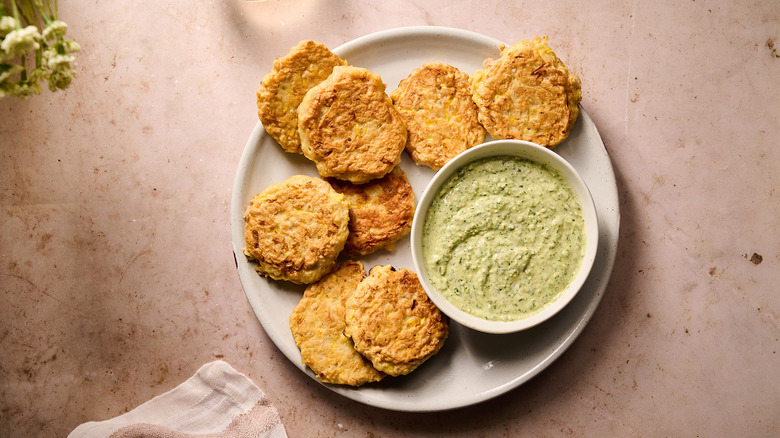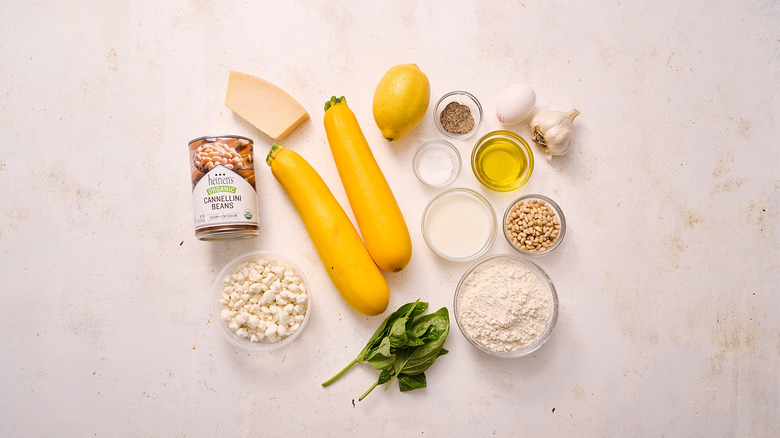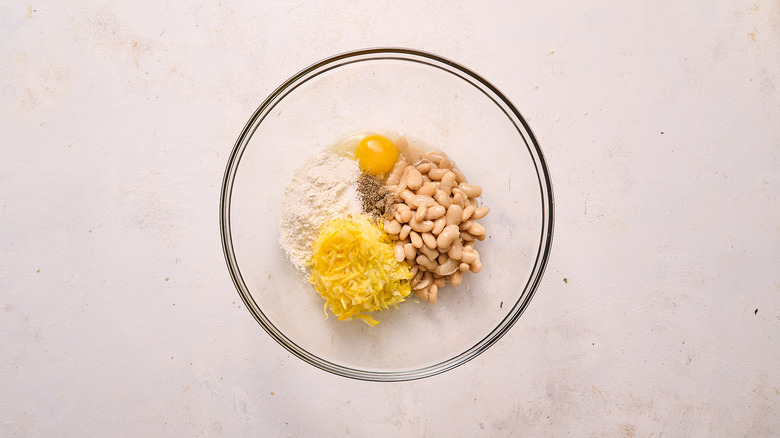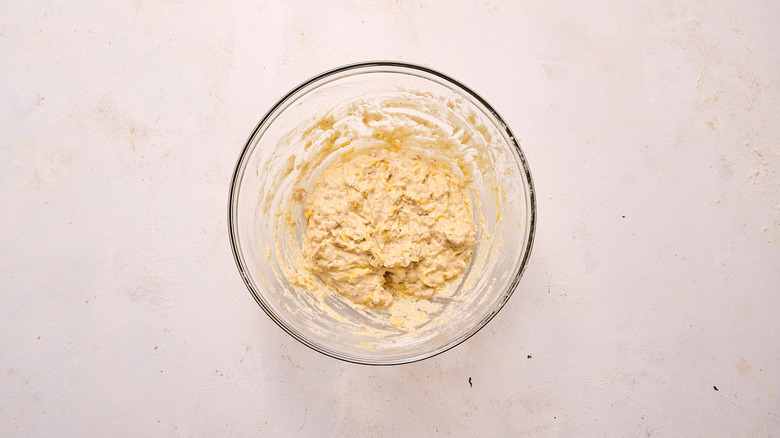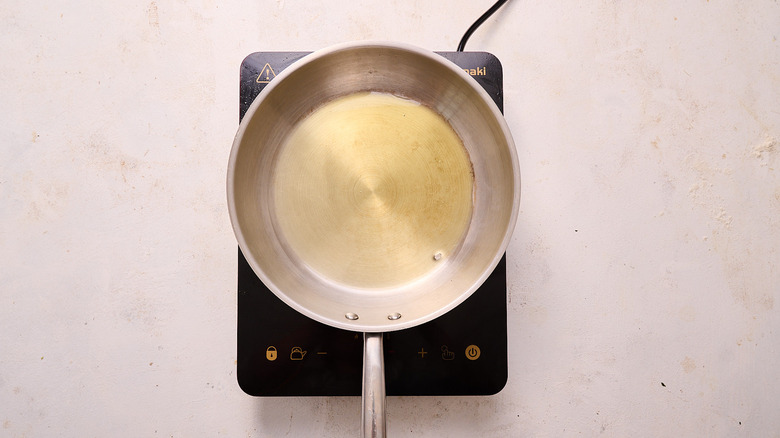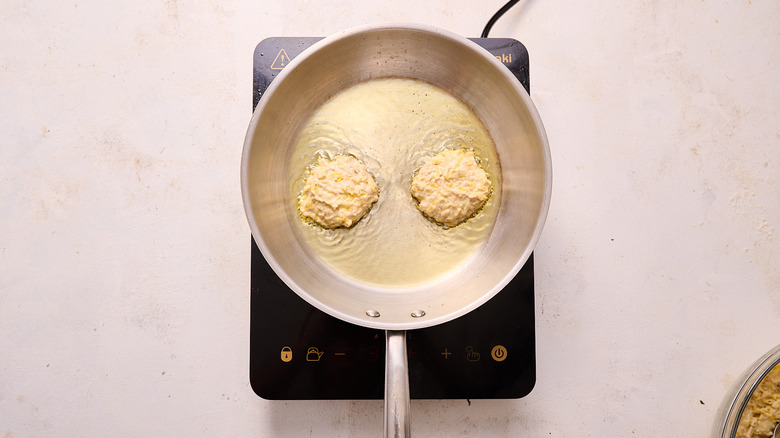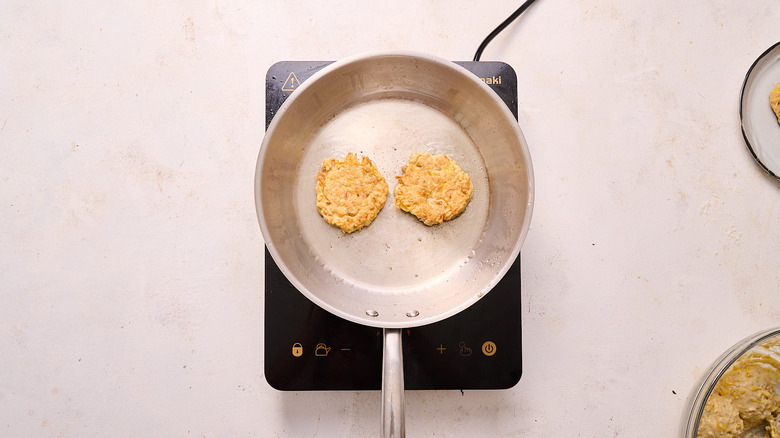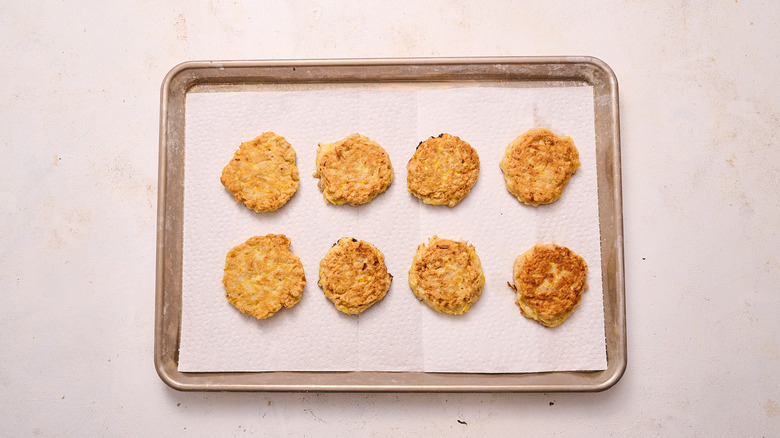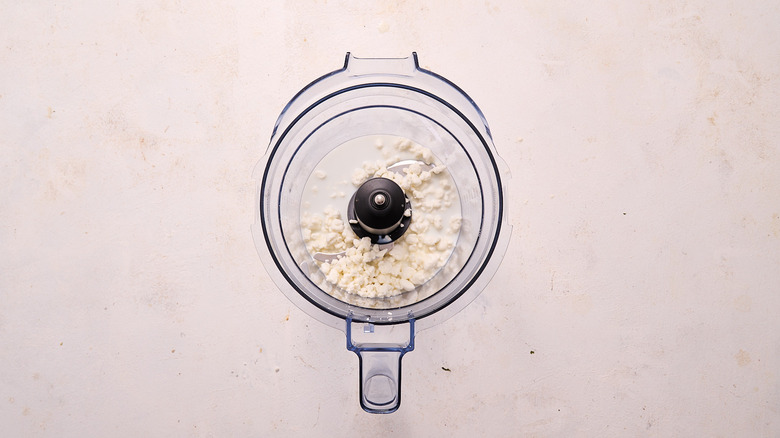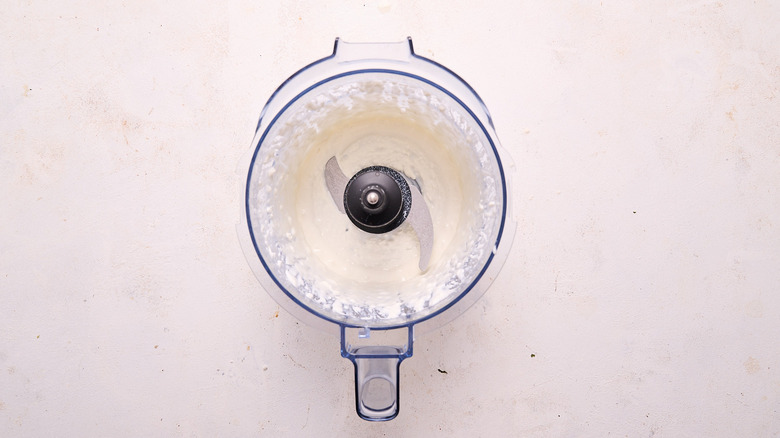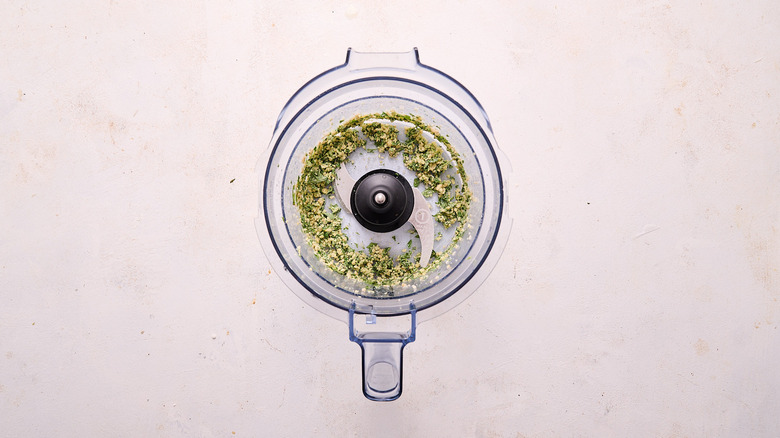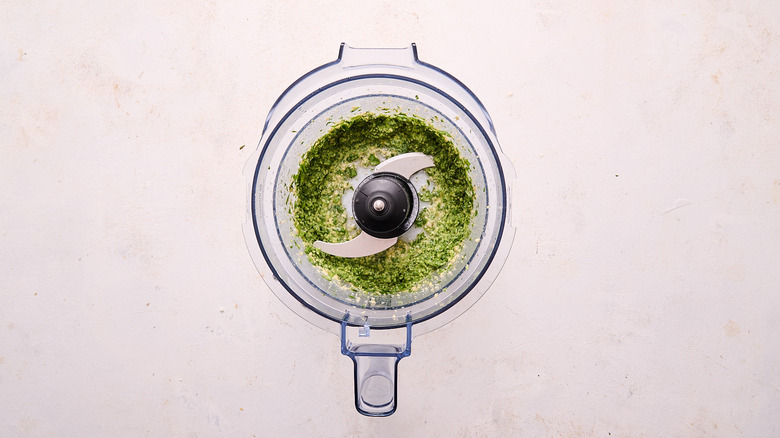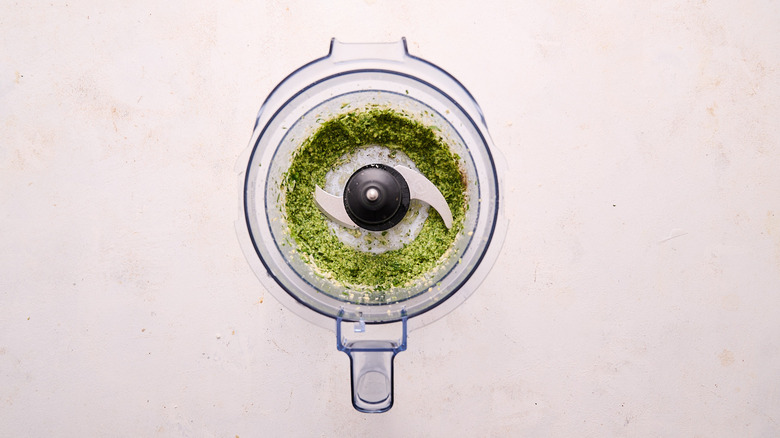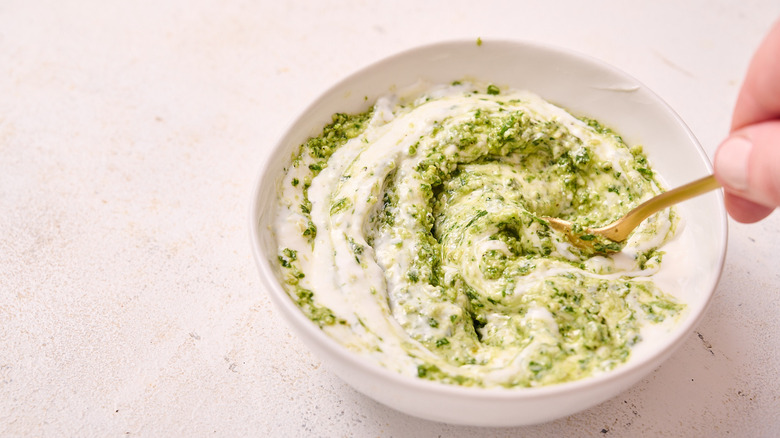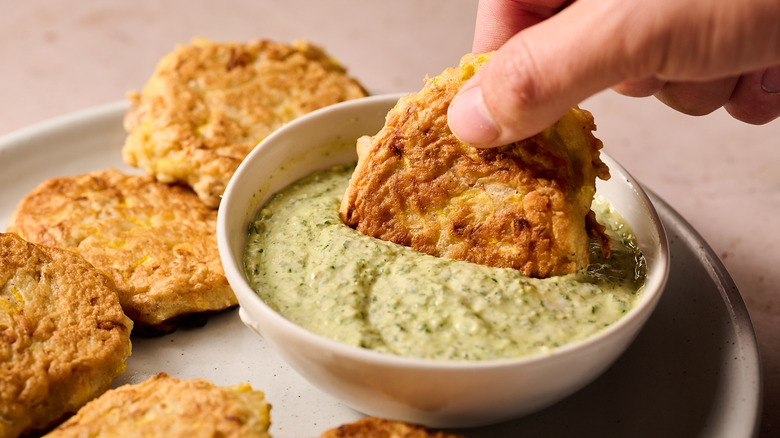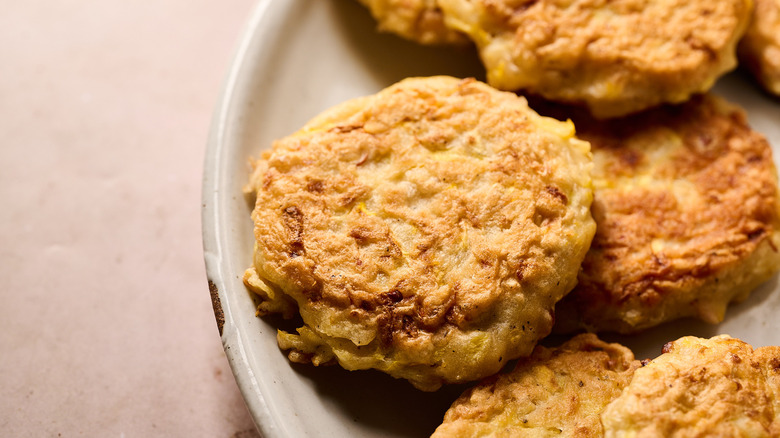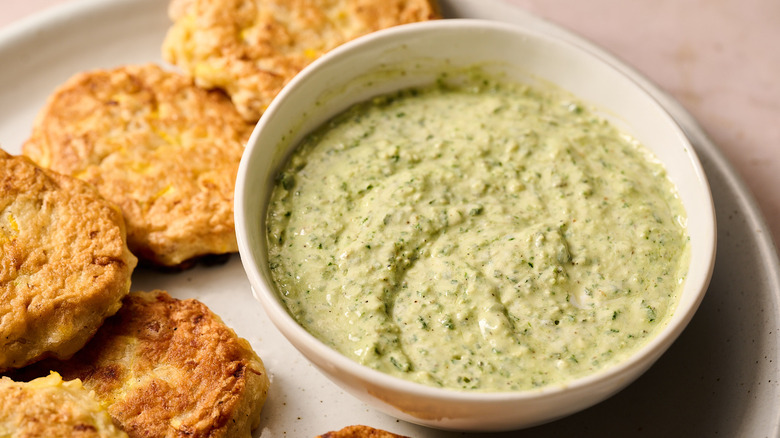Summer Squash Fritters With Pesto Goat Cheese Dipping Sauce Recipe
The best part of summer, at least for anyone who likes to cook, is bringing home a basket of fresh vegetables from the local farmer's market. Leafy greens, crunchy corn, and those perfect, colorful tomatoes take residence on our countertops from June through August, inspiring our dinner menus with fresh new ideas. Week after week we also find ourselves stocking up on large, brightly-colored summer squash, often just for throwing on the grill as easy weeknight side dishes. The truth is, though, that squash is just as versatile as any other summer veg — and can even be the star of the show.
This recipe written with developer Michelle McGlinn showcases summer squash in the form of a fritter, fried up in a thick batter of white beans and garlic. The fritters are moist and soft throughout with a crispy exterior, and perfect for dipping into sauce. The sauce we suggest utilizes another summer favorite in fresh basil and calls for swirling homemade pesto into fluffy whipped goat cheese. Together the fritters and sauce reimagine some of our farmer's market favorites, letting us enjoy farm-fresh bounty all summer long.
Gathering ingredients for summer squash fritters with pesto goat cheese dipping sauce
For the fritters, you'll need salt, pepper, flour, olive oil, egg, garlic, squash, and beans. You'll want to choose a soft white bean for this recipe, such as cannellini, great northern, or navy — garbanzo is not as creamy but can work in a pinch. As for the squash, you'll need just one cup, which is only about half of one medium-sized squash. From there, you'll also need crumbled goat cheese, milk, basil, pine nuts, lemon juice, and Parmesan. You can swap the pine nuts for any nut, like walnut or almond, or simply omit them if you have any allergies.
Step 1: Combine the fritter ingredients
In a large bowl, combine the yellow squash, cannellini beans, flour, egg, garlic, salt, and pepper.
Step 2: Mix it into a batter
Use your hands to combine the mixture until a thick batter forms.
Step 3: Heat oil in a skillet
Heat the oil in a skillet over medium heat.
Step 4: Scoop the fritters into the skillet
Using a 1 ½-inch cookie scoop, scoop fritters into the hot skillet, working in batches as needed. Flatten each fritter into a ½-inch disc.
Step 5: Cook the fritters
Cook until browned, flipping once, about 2 to 3 minutes per side.
Step 6: Drain the fritters
Remove the fritters and drain them on paper towels.
Step 7: Add the goat cheese and milk to a a processor
To make the dipping sauce, first make the whipped goat cheese. Add the goat cheese and milk to a food processor.
Step 8: Blend till smooth
Blend the goat cheese until smooth.
Step 9: Start the pesto
Remove the goat cheese to a bowl and set aside. Wipe the processor clean and blend the basil, nuts, garlic, and lemon juice in a food processor until chopped.
Step 10: Add the olive oil
Slowly add the olive oil while running the processor until the pesto is emulsified and smooth.
Step 11: Add the Parmesan and seasonings
Pulse in the Parmesan, salt, and pepper until combined.
Step 12: Combine the pesto and goat cheese
Swirl the pesto into the whipped goat cheese.
Step 13: Serve the fritters
Serve the fritters with whipped pesto goat cheese on the side.
Summer Squash Fritters With Pesto Goat Cheese Dipping Sauce Recipe
Tender fritters showcase versatile summer squash, which is mixed in a white bean and garlic batter, fried till crispy, and served with a goat cheese pesto dip.
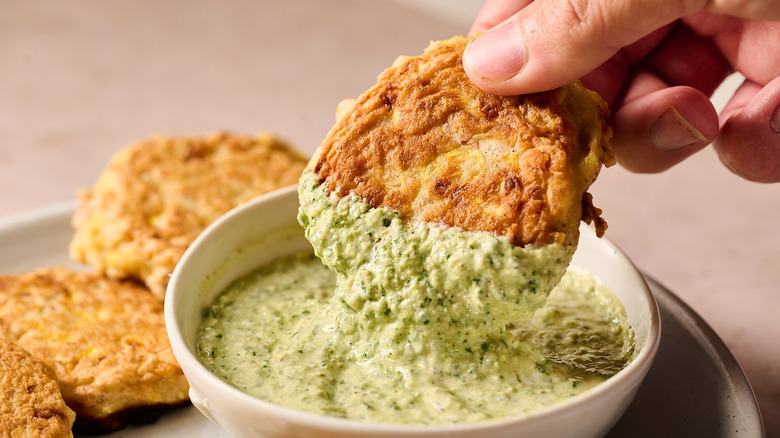
Ingredients
- For the fritters
- 1 cup grated yellow squash
- 1 cup cannellini beans, drained
- 1 cup flour
- 1 egg
- 2 cloves garlic, grated
- ½ teaspoon salt
- ½ teaspoon pepper
- 2 tablespoons olive oil, for frying
- For the pesto whipped goat cheese
- 4 ounces crumbled goat cheese
- ¼ cup milk
- 2 cups basil
- ¼ cup pine nuts
- 1 clove garlic
- 2 teaspoons lemon juice
- ¼ cup olive oil
- ¼ cup grated Parmesan cheese
- ¼ teaspoon salt
- ¼ teaspoon pepper
Directions
- In a large bowl, combine the yellow squash, cannellini beans, flour, egg, garlic, salt, and pepper.
- Use your hands to combine the mixture until a thick batter forms.
- Heat the oil in a skillet over medium heat.
- Using a 1 ½-inch cookie scoop, scoop fritters into the hot skillet, working in batches as needed. Flatten each fritter into a ½-inch disc.
- Cook until browned, flipping once, about 2 to 3 minutes per side.
- Remove the fritters and drain them on paper towels.
- To make the dipping sauce, first make the whipped goat cheese. Add the goat cheese and milk to a food processor.
- Blend the goat cheese until smooth.
- Remove the goat cheese to a bowl and set aside. Wipe the processor clean and blend the basil, nuts, garlic, and lemon juice in a food processor until chopped.
- Slowly add the olive oil while running the processor until the pesto is emulsified and smooth.
- Pulse in the Parmesan, salt, and pepper until combined.
- Swirl the pesto into the whipped goat cheese.
- Serve the fritters with whipped pesto goat cheese on the side.
Nutrition
| Calories per Serving | 676 |
| Total Fat | 36.7 g |
| Saturated Fat | 9.5 g |
| Trans Fat | 0.0 g |
| Cholesterol | 60.9 mg |
| Total Carbohydrates | 61.7 g |
| Dietary Fiber | 9.7 g |
| Total Sugars | 2.4 g |
| Sodium | 526.5 mg |
| Protein | 27.5 g |
What are some tips for making perfect fritters?
To achieve the flat and circular shape textural crunch notable of fritters, you need to be sure the batter has just the right consistency. It should resemble pancake batter but with more density and thickness. The batter shouldn't be so thick that it becomes a paste, however; this will cook into a stodgy and chewy fritter. Aim for a consistency that can be scooped but doesn't form a solid shape — the batter should drop into the skillet and begin to spread, but ultimately be thick enough to smash down with a spatula. If it's too thin, add more flour. If it's too thick, add either a few more scoops of squash, which has a high water content, or a splash of milk.
From there, make sure the oil is hot in the skillet and press down firmly on the ball of batter so that the fritter is as thin as possible — it will rise slightly as it cooks. Deeply brown the first side, then flip and press down again so that the remaining side is entirely engaged with the hot skillet. Unlike delicate pancakes, a fritter should be cooked firmly against the skillet to ensure that crispy crust.
What other kinds of pesto can I use?
When you hear the word "pesto," you most likely think of pesto Genovese, the basil, pine nut, garlic, and olive oil mixture. Of course, that's the most well-known pesto recipe, but you can find different varieties throughout Italy. Pesto Calabrese calls for roasted red peppers along with garlic, pine nuts, and Parmesan, and Pesto alla Trapanese adds tomatoes to the mix. Both would be delicious swirled into goat cheese.
The easiest way to switch up a classic pesto is through the nuts, which can be swapped for walnuts, almonds, or even pistachios. You can also lightly toast the nuts first for an earthier-tasting pesto with a nut-forward flavor. Next, you can swap out the basil for another green. Sure, we all love the intoxicating scent of fresh basil, but pesto can be made with kale, parsley, garlic scapes, mint, or even the tops of carrots. One of our favorite pairings? Walnut, parsley, and plenty of fresh spinach.
While this recipe is fairly easy to make from scratch, you can make it a few steps shorter (and save yourself the cleanup) by using store-bought pesto, which can be found in jars near the pasta sauce or in the refrigerator near the fresh pasta. For a different flavor entirely, try adding more flavor to your store-bought by blending in sun-dried tomatoes, capers, or red pepper flakes.
